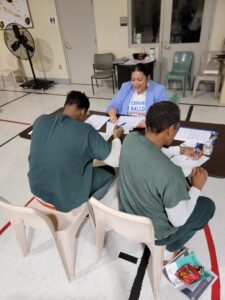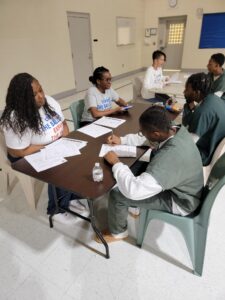Blog Post
Maryland Voting Rights Act: Key to Fair Redistricting in Baltimore County
Article
Voting is a fundamental aspect of democracy, ensuring that every citizen has a voice in shaping their government. However, the process often overlooks certain populations, particularly those who are incarcerated. In Maryland and most states, people in jail pretrial, awaiting sentencing, or serving time for a misdemeanor can vote. The issue is access.
Across the country, close to 500,000 people being held in jails are eligible to vote. In Maryland, that number is closer to 12,000.
That’s why in 2021, Common Cause Maryland and partners worked to pass the Value My Vote Act (HB 222), which requires election officials and correctional institutions to provide information and opportunities to register to vote, to apply for a mail-in ballot, to cast that ballot, and to return it in a timely fashion.

Still, many jail facilities in Maryland fail to fully allow eligible voters to access the ballot.
However, A stand out facility in ensuring access to voting rights is the Ordnance Road Correctional Center in Anne Arundel county.
Recently, the Maryland Board of Elections along with Common Cause Maryland, and representatives from The Expand the Ballot, Expand the Vote Coalition, a coalition founded by and is led by formerly incarcerated individuals and state and national organizations, visited the Ordnance Road Correctional Center. There, we were able to facilitate voter registration and mail in ballot requests for over 110 men and women incarcerated in the facility.
From the time that we arrived, the men and women were ready to engage with us.
Many did not realize their eligibility to vote in Maryland if they had a past felony that they were not currently serving a sentence for. Few were also District of Columbia residents, and were eligible to vote even if they were currently serving time for a felony conviction. We also encountered a couple of individuals that already requested their absentee ballot, and voted already!
After 4 hours of engaging with men and women in the facility, we were able to register and request mail-in ballots for over 60 Marylanders.
One gentleman shared with us that he just turned 20 this year and was excited to vote for the first time in this year’s presidential election!
Voting is not only an act of civic engagement but also a step towards inclusivity and empowerment for all individuals, regardless of their involvement with the criminal legal system.
 Unfortunately, although eligible, many individuals in jails are de facto disenfranchised and often unaware of their rights. By bringing voter registration efforts into jails, we can help bridge the gap, allowing individuals who are awaiting trial or serving short sentences to participate in the electoral process. This initiative is crucial for fostering a sense of belonging and agency among those who are too often marginalized.
Unfortunately, although eligible, many individuals in jails are de facto disenfranchised and often unaware of their rights. By bringing voter registration efforts into jails, we can help bridge the gap, allowing individuals who are awaiting trial or serving short sentences to participate in the electoral process. This initiative is crucial for fostering a sense of belonging and agency among those who are too often marginalized.
All told, in the United States upwards of 22 million people don’t or can’t vote due to current or past involvement with law enforcement.
The disenfranchisement of those in prison is not new; it is one of the oldest and most effective acts of voter suppression. By silencing the voices of people in prison and those previously convicted of a felony, the people who are most affected by a flawed democracy are unable to express their grievances at the ballot box.
Felony disenfranchisement laws have such a racially tainted legacy that one should question whether we would even have these laws were it not for the purpose of weakening the voting power of communities of color and the poor. The combination of policymakers implementing laws designed to target black voters with states enacting broad disenfranchisement laws that revoked voting rights had the desired effect of keeping black people from voting in elections.
We must do better to realize the promise of democracy. Visiting the Ordnance Road Correctional Center in Anne Arundel county was not just about filling out forms or registering voters for the sake of increased voter turnout; it’s about fostering a sense of community and belonging among individuals who are often isolated from the democratic process. By taking this step, we can help empower those behind bars, reminding them that their voices matter and encouraging them to participate in shaping the future of their communities. It’s a small but significant step toward a more inclusive and restorative democracy.
Blog Post
Blog Post
Blog Post